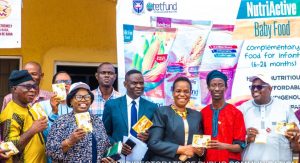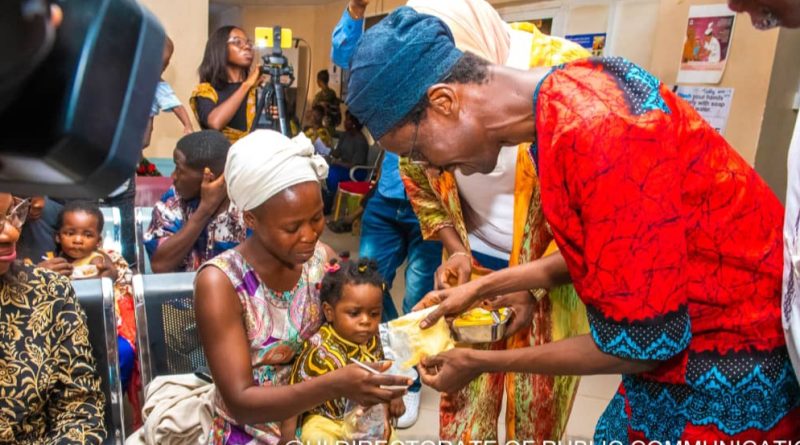Research breakthrough as UI research team formulates complementary baby food
Oru Leonard
A research team from the Department of Agricultural Extension and Rural Development and the Department of Food Technology at the University of Ibadan has formulated complementary baby food for children between the ages of six months and two years solely from locally available food items.
The formula is the result of a TETFund Intervention Project approved for the University of Ibadan.
At a sensory evaluation presentation of the “Nutri Active Baby Food” in Ibadan, the Vice-Chancellor, Professor Kayode O. Adebowale, mni, FAS, described the research team as a group of astute researchers and contributors to the economic development of Nigeria.
He was represented by the Deputy Vice-Chancellor Administration, Professor Peter O. Olapegba, FNPA.
Professor Adebowale noted that the project looked inwards using locally and readily available food items to meet the nutritional needs of our growing children.
This, he said, would make local industries to grow, children would be well fed, and employment opportunities would be provided.
The Vice-Chancellor assured that the University of Ibadan will give most support to the project while appreciating TETFUND for sponsoring it.
The Principal Investigator of the project, Professor M. K. Yahaya said the efforts of the research team were focused on putting indigenous products together.
He said the formula was capable of sustaining the children for days without any other food items as it is very rich in nutrients needed for survival.
Professor Yahaya said the team would partner with the Nigerian food industry to mass produce the formula, thus saving the nation billions of naira that could have been spent on the importation of complementary food for the babies.
He said this was UI’s contribution to the substitution of imported food.
The Director General of the Federal Radio Corporation of Nigeria, Dr. Mohammed Bulama was the Special Guest of Honour at the public presentation. He was represented by the Zonal Director of the FRCN, Mr Dominic Mokikan.
Dr. Bulama commended the efforts of the research team, saying that the intervention project was apt and timely as the majority of children today suffer from malnutrition arising from poverty and escalating costs of children needs.
He, however, charged the researchers to be mindful of the impact the formula could have on the children who are sure hope of a better tomorrow and ensure that it is safe.
The Director General appealed to the authorities to improve the economic, socio, and political well-being of Nigerians by putting in place policies that will help the citizens to ‘eat right’, which will on the long run turn the country into a wealthy and prosperous nation.
“Eating Right does not only mean eating a variety of foods that can give the nutrients needed to feel good, maintain good health and right energy for our day-to-day activities. It entails eating the right quality and quantity of food at the right time,” Dr Bulama said.
Goodwill messages were also received at the ceremony from the Deputy Vice-Chancellor Academic, Professor Aderonke Baiyeroju who was represented by Professor O. T. Jeremiah; the Deputy Vice-Chancellor Research Innovation and Strategic Partnerships, Professor Oluyemisi A. Bamgbose, SAN; Dean of Agriculture, Professor A. B. Omojola, who was represented by Professor T. O. Ososanya; the immediate past Dean of Agriculture, Professor Stella Odebode; Director of the Research Management Office, Professor A. S. Jegede; and the Director of the Centre for Intellectual Property and Commercialisation, Dr Oladapo Okareh.
An investigator on the project, Dr Mojisola Oyewole, explained that the formula was derived from the combination of soy bean, date palm, maize, sorghum, rice, banana, and orange fleshed sweet potatoes that are readily available all over the country. It will come out in three flavours.
She said sensory evaluation had been done in Sokoto, Kebbi, Niger, and Kwara States in the North and Bayelsa, Ebonyi, Imo, and Oyo States in the South.
The long-term goals of the project are: the overall improvement of children nutrition in economically advantaged and less advantaged communities; drastic reduction of severe acute malnutrition in young children; and improvement of nutrient deficiency in protein, vitamins and minerals in the young children who would be the direct beneficiaries.




